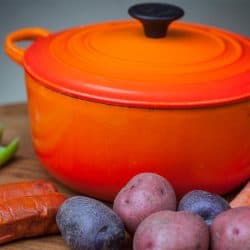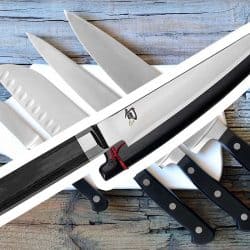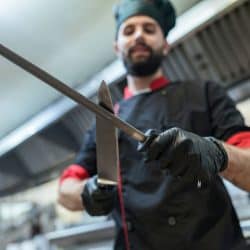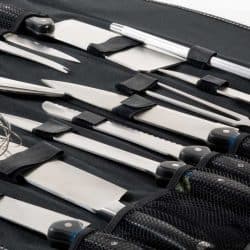It’s time to buy a new set of kitchen knives and you've begun to consider all your options. When purchasing something as important as daily-use kitchen blades, it’s important to know all about them. You’ve read all the reviews, and now the idea of Shun knives is appealing. But what exactly are Shun knives made of and can they resist rust?
Shun knives are made of Japanese stainless steel. Each Shun knife has a core made of VG10 or SG2 steel, surrounded by multiple layers of Damascus steel. Since these knives are made of stainless steel, they do not rust. With proper care, Shun knives can be kept free of corrosion and last a lifetime!
Now that you know what Shun knives are made of, you're probably wanting to know more about these kitchen knives. Keep reading to learn even more about them!
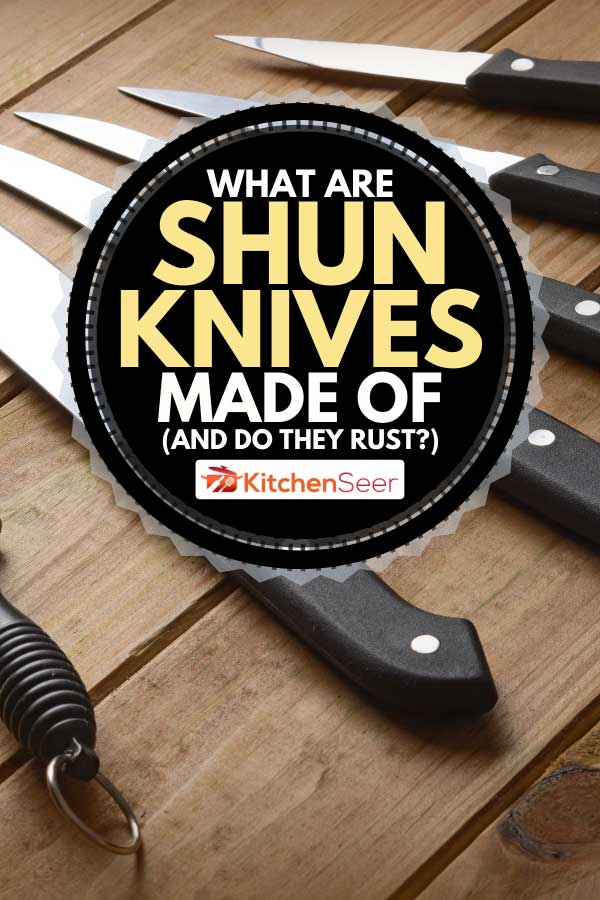
What Shun Knives Are Made Of
The Japanese stainless steel knife blades are crafted from traditional forging or from sheets of steel that are ground and sharpened. More specifically, the core of each Shun knife is made of VG10 or SG2 steel. Several layers of Damascus steel surround the core for the ultimate amount of strength. The blade is very sharp and has a nice flowy-looking pattern to it.
Shun knives are fashioned so that their steel is thinner and harder, ensuring less force is required to make the intended cut. This is a defining characteristic of Japanese steel. Though less muscle is needed to cut, it does make the blade more prone to chipping.
Knife chipping can be easily prevented by using a wooden chopping board as opposed to glass or other hard materials. You must also be sure you are using the proper cutting technique, as well as never using your Shun knives to cut bones or vegetables with overly-thick skin.
Most Shun knife handles are designed with Pakkawood- a material made of genuine hardwood treated with resin for water resistance.
Why Shun Knives Do Not Rust
Since these knives are made of stainless steel, they do not rust. They are prone to a corrosive layering effect which is the steel protecting itself from rusting. However, with proper care, Shun knives can be kept free of corrosion and last a lifetime!
Where Are Shun Knives Made?
Shun knives are made by the Kai Corporation in Seki City, Japan. Each blade is hand-crafted and takes time and dedication to complete. It’s the attention to detail when hand-crafting that separates Shun knives from the competition and truly makes them the superior blade.
How Do You Store Your Shun Knives?
How you store your knives is equally as important as handwashing them. Knives are best kept in a wooden block, which most knife manufacturers have available for purchase. Throwing them in a drawer with a wealth of other utensils causes preventable damage. Even though your knives are made of metal in most cases, think of them as delicate, and remember you want these products to last!
Once more, remember to dry your knives completely before storing them since the enclosed space of the wooden block could encourage micro-corrosion.
Alternatively, your knives can be stored in a knife case, a magnetic bar, or a sheath. Make sure your knives are kept in a way that will not be a hazard and cause you or a loved one injury.
How Do You Keep A Shun Knife Sharp?
One of the best ways to keep your Shun knife sharp is with a honing steel. This sharpening tool typically comes with all knife block sets.
Shun Honing Steel
Click here to see more on Amazon.
If you don’t wish to use a honing steel to keep your Shun knife in excellent condition, the manufacturer advises a few other methods:
1. Use a whetstone.
Whetstone Knife Sharpening Stone
Click here to see more on Amazon.
2. Use a tabletop sharpener. The sharpener must accommodate the 16% bevel found on nearly all Shun blades.
Homegician Kitchen Knife Sharpener
Click here to see more on Amazon.
3. Send the knife away to be professionally sharpened.
What Is A Good Metal For Knives?
The most common types of metal used for knife blades are carbon, stainless, alloy, or tool steel. The idea of which metal is best is subjective and can vary depending on the intended use of the knife.
The hardness of the blade should be taken into account as the hardness dictates how much force might need to be placed upon the blade for the intended cut. Hardness is measured by something called the Rockwell C scale (HRC). For example, a knife with a “harder” steel number on the HRC scale would be ideal for cutting sinewy meat, whereas a softer knife could be used for paring.
Overall, most kitchen knives are made using stainless steel, as stainless steel does not rust.
The metal that's used for Shun knives, especially the layered Damascus steel, allows the knives to be continually sharpened to a fine point. With the solid interior and softer exterior, the difference after sharpening can be quite profound.
How Do You Prevent Knives From Rusting?
You have the perfect knife and feel confident in your decision. Now, how do you care for it? The most important part of the longevity of your steel is cleaning and storage.
First and foremost, knives, especially Shun knives, must be washed by hand. Although you can wash a Shun knife (or any knife) in a dishwasher, the risk is not worth it. When a knife is run through a dishwashing cycle, chances are it will be knocked around, heightening the risk of the knife’s integrity being compromised. The result could end in dullness and chips in the steel.
Furthermore, ensure that your knives are completely dry before storing them. Though stainless steel knives will not rust, the steel can corrode to coat itself and prevent rusting. Even though this is a correctable issue, why create the extra hassle for yourself? Remember, not all knives are stainless steel, so excess moisture will cause rust on these types of knives. Once the knives have rusted, they are ruined.
If your knife is not stainless steel, it helps to learn if your knife is galvanized. Galvanization is the process of applying a protective zinc coating to protect the metal from rusting. Even with galvanized steel, keep those knives dry as much as possible! Proper storage also prevents unnecessary micro-corrosion from occurring.
In Closing
Find the knife that suits your needs and lifestyle!
Knowing your own needs in a kitchen knife is key to finding the knife that works best for you. Shun knives are popular, strong, and rust-resistant. Find the style that calls to you and what you are led to do in the kitchen, and don’t forget to enjoy your shopping experience.
Before you go, be sure to check out these other kitchen guides that may be of interest:
Which Shun Knife Is Best For Cutting Meat?
How Long Do Kitchen Knives Last?




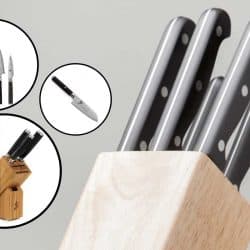
![Wusthof Classic Ikon Big Cooking Knife isolated above white background, Do Wusthof Knives Rust? [And How To Prevent This]](https://kitchenseer.com/wp-content/uploads/2022/12/Wusthof-Classic-Ikon-Big-Cooking-Knife-isolated-above-white-background-1-250x250.jpg)
